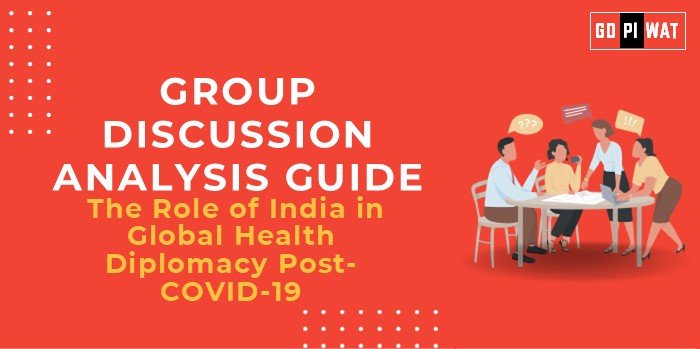📋 Group Discussion (GD) Analysis Guide: The Role of India in Global Health Diplomacy Post-COVID-19
🌐 Introduction to the Topic
💊 Opening Context: The COVID-19 pandemic underscored the importance of global health diplomacy, with India emerging as a key player by leveraging its pharmaceutical prowess and public health strategies.
🌍 Topic Background: India’s contributions to the global health landscape include vaccine development, affordable generic medicines, and capacity-building in low-income countries. The country’s role in initiatives such as “Vaccine Maitri” demonstrated its commitment to global health equity, elevating its diplomatic influence.
📊 Quick Facts and Key Statistics
- 💉 COVID-19 Vaccination Drive: Over 2 billion doses administered domestically (Ministry of Health, 2023).
- 🌐 Vaccine Exports: Over 300 million doses to 100+ countries under “Vaccine Maitri.”
- 📦 Pharmaceutical Industry: Accounts for 20% of global generic drug exports (IBEF, 2023).
- 👩⚕️ Healthcare Workforce: 18% of the global healthcare workforce is Indian-trained.
🎯 Stakeholders and Their Roles
- 🏛️ Government of India: Policy-making and diplomatic outreach through initiatives like “Vaccine Maitri.”
- 💼 Pharmaceutical Industry: Manufacturing vaccines and affordable generic medicines.
- 🌍 Global Organizations: WHO, GAVI, and COVAX partner with India for vaccine distribution.
- 🤝 Recipient Countries: Collaborate with India for capacity-building and medical supplies.
🏆 Achievements and Challenges
🔑 Achievements
- ✔️ Successful Vaccine Campaigns: Effective production and export of vaccines to bridge the global vaccine divide.
- 🌐 Global Partnerships: Strong collaborations with WHO, GAVI, and African nations for healthcare capacity-building.
- 📢 Advocacy Leadership: Recognition as a leader in promoting equitable global health access.
⚠️ Challenges
- 🔄 Supply Chain Vulnerabilities: Disruptions during global crises.
- 🏥 Domestic Healthcare Strains: Insufficient capacity during pandemic waves.
- 🌏 Emerging Competition: Rising influence of China in health diplomacy.
🌍 Global Comparisons
- 🇨🇳 China: Used health aid for diplomatic leverage in Africa.
- 🇺🇸 USA: Focused on mRNA technology but lagged in affordable global distribution.
📖 Case Study
📍 “Vaccine Maitri” Initiative: Enabled equitable vaccine distribution to low-income nations, boosting India’s diplomatic standing.
🗣️ Structured Arguments for Discussion
- ✅ Supporting Stance: “India’s Vaccine Maitri showcases its leadership in equitable healthcare access globally.”
- ❌ Opposing Stance: “India’s domestic health crises highlight gaps in its healthcare priorities amid global commitments.”
- ⚖️ Balanced Perspective: “India’s strides in global health diplomacy are commendable, but strengthening domestic systems is essential for sustained leadership.”
💡 Effective Discussion Approaches
🌟 Opening Approaches
- 📊 “With over 300 million vaccine doses exported, India has redefined its role in global health diplomacy.”
- 🌍 “The pandemic highlighted both India’s potential and challenges in global health leadership.”
🎯 Counter-Argument Handling
- 🔄 “While India has made remarkable contributions globally, balancing domestic needs is key to its credibility.”
📊 Strategic Analysis of Strengths and Weaknesses
- 💪 Strengths: Pharmaceutical expertise, strong international partnerships.
- 📉 Weaknesses: Domestic healthcare gaps, reliance on global supply chains.
- 🌟 Opportunities: Leadership in health technology and AI integration.
- ⚠️ Threats: Geopolitical tensions, competition from other nations.
📚 Connecting with B-School Applications
- 🧠 Real-World Applications: Linking global health diplomacy to international business, policy analysis, and operations management.
- 📋 Sample Interview Questions:
- 🤔 “How can India balance global health leadership with domestic healthcare needs?”
- 🌍 “Discuss the role of public-private partnerships in advancing global health initiatives.”
- 💡 Insights for B-School Students:
- 🌐 Focus on sustainable healthcare models and global supply chain management.


